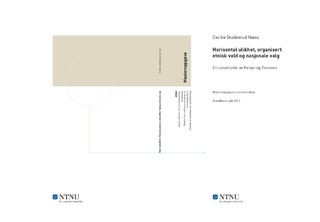| dc.contributor.advisor | Theisen, Ole Magnus | nb_NO |
| dc.contributor.author | Næss, Cecilie Stubberud | nb_NO |
| dc.date.accessioned | 2014-12-19T14:36:08Z | |
| dc.date.available | 2014-12-19T14:36:08Z | |
| dc.date.created | 2012-09-25 | nb_NO |
| dc.date.issued | 2012 | nb_NO |
| dc.identifier | 556467 | nb_NO |
| dc.identifier.uri | http://hdl.handle.net/11250/268557 | |
| dc.description.abstract | Denne masteroppgaven undersøker forhold hvor etniske skillelinjer blir politisk viktige. Den gjør det ved å sammenligne det generelt fredelige Tanzania med det mer konfliktpregede Kenya. Det faktum at begge land er multietniske, tidligere britiske kolonier, at de har en historie med ettpartistyre, de er begge fattige land samt at de begge er avhengige av jordbruket, muliggjør en fokusert sammenlikning. Den største forskjellen mellom de to landene, i alle fall ved første øyekast, er den tilbakevendende volden i Kenya i perioder med nasjonale valg. Jeg argumenterer for at dette problemet eksisterer på grunn av Kenyas manglende evne til å skape en nasjonal fellesskapsfølelse, og på grunn av måten politiske partier i landet er sammensatt. Implikasjoner som gruppestørrelse, frustrasjon og mulighet for vold analyseres for å kunne svare på hvordan en nasjonal identitet og politiske partier etableres. På den andre siden av argumentasjonen har Tanzania fått et fredfullt samfunn på grunn av et mer inkluderende politisk system, samt den nasjonale identiteten som har gått i arv fra Julius Nyereres politikk. Denne utgreiingen for årsaker til vold og betingelser for fred kan bidra til avdekke hvordan Kenya også kan oppnå fredelige valg, i hvert fall på sikt.
Nøkkelord: etnisitet, valg, politiske partier, organisert etnisk vold, Kenya, Tanzania | nb_NO |
| dc.description.abstract | This thesis explores the conditions under which ethnic cleavages become politically salient. It does so by comparing the generally peaceful society of Tanzania, to the relatively more conflict prone society of Kenya. Both being multiethnic countries, both former colonies of Great Britain, both having a history of one-party rule, both rather poor countries and both dependent on agricultural resources, facilitates a focused comparison. The biggest difference between the two countries, at least at first glance, is the returning violence in Kenya in periods of national elections. I argue that this puzzle exist because of Kenya’s inability to create a common national feeling, and because of the composition of political parties in the country. Further variables such as group size, frustration and opportunity of violence, are considered, to be able to explain the lack of national feeling and composition of political parties. On the contrary, Tanzania has gained a peaceful society because of the national identity inherited from the politics of Julius Nyerere, and a political system that includes many ethnic groups. Answering the causes of violence and the conditions for peace might, in the long run at least, contribute to Kenya also becoming a peaceful society.
Key words: ethnicity, elections, political parties, organized ethnic violence, Kenya, Tanzania | nb_NO |
| dc.language | nor | nb_NO |
| dc.publisher | Norges teknisk-naturvitenskapelige universitet, Fakultet for samfunnsvitenskap og teknologiledelse, Institutt for sosiologi og statsvitenskap | nb_NO |
| dc.title | Horisontal ulikhet, organisert etnisk vold og nasjonale valg: En casestudie av Kenya og Tanzania | nb_NO |
| dc.type | Master thesis | nb_NO |
| dc.source.pagenumber | 98 | nb_NO |
| dc.contributor.department | Norges teknisk-naturvitenskapelige universitet, Fakultet for samfunnsvitenskap og teknologiledelse, Institutt for sosiologi og statsvitenskap | nb_NO |
